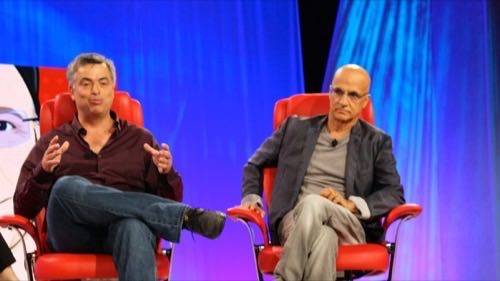
Apple executives made their first public appearance after announcing the company’s $3 billion acquisition of Beats Electronics, the audio accessories maker, and Beats Music, a streaming-music service, Wednesday evening at the Code Conference in Los Angeles.
Eddy Cue, who spearheaded Apple’s iTunes Store, and Beats cofounder Jimmy Iovine, said they struck the deal out of concern for the health of the music industry.
Iovine spoke about growing up in Brooklyn and wanting to escape his rough neighborhood. He compared the music business to a similarly rough neighborhood.
“We wanted to move to a better neighborhood” by selling the company to Apple, Iovine said.
“Music is dying,” said Cue. “It hasn’t been growing. You see it in the number of artists. This past year in iTunes, it’s the smallest number of new releases we’ve had in years.”
Bring Back The Album (Experience)
First Napster and then iTunes destroyed the notion of albums as a listening experience, reducing music to a soup of individual songs. Through Beats Music, which features human-selected playlists, Iovine and cofounder Dr. Dre have been aiming to bring that album-like experience back.
See also: Beats Music Review: Finally, A Digital DJ That Knows Its Stuff
Here’s how Iovine described it:
The sequencing of an album was very important. Music is made in bite-sized pieces, but you need an hour’s worth of music for certain activities. The other guys have an algorithm. For some reason, these young people aren’t understanding why they aren’t getting the feel they’re supposed to get. We said no, no, you’re supposed to have the right sequence.
People are not being moved by it. People are going to pay for an experience. If you don’t have good sound, no one’s going to pay for it. People aren’t going to know why it’s not right. It’s just flat.
Beats has only been out for a few months, as Iovine pointed out. iTunes Radio, a universally ignored streaming feature of Apple’s iTunes music software that’s similar to Beats, Pandora, and Spotify, has 40 million listeners—almost a hundred times the size of Beats, which requires a paid subscription and doesn’t offer a free, ad-supported version. So Apple didn’t buy Beats for its user base, but for its growth potential.
Both Cue and Iovine used the phrase “on steroids” to describe Apple’s plans for Beats Music.
An Audible Future
Cue and Iovine shed less light on plans for Beats hardware. Cue said Apple would keep the Beats brand.
See also: Forget Wearables—Get Ready For Earables
“It’s not about what Apple is doing today or what Beats is doing today,” said Cue. “It’s about what we can do together.”
So what could Apple and Beats do together?
Iovine expressed respect for Apple’s technical prowess with audio.
“I’ve worked for 10 years with the engineers at Apple,” he said. “I know how much they care about audio.”
One thing they don’t plan to do is commission their own music. Iovine said he had no plans to work on an in-house label at Apple, describing himself as a “retired music-industry executive.”
“I’m not even thinking about that,” said Iovine. “I’m thinking about getting the delivery right and the curation right. I like chocolate, but I’m not Willy Wonka; I’m not going to run a chocolate factory.”

















